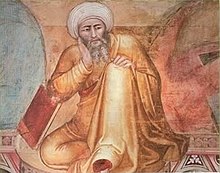
Back رشدية Arabic Averroizm Azerbaijani Авераізм Byelorussian Averroisme Catalan Averroismus German Αβερροϊσμός Greek Averroísmo Spanish Averroismo Basque اورئیسم Persian Averroismi Finnish

Averroism refers to a school of medieval philosophy based on the application of the works of 12th-century Andalusian philosopher Averroes, (known in his time in Arabic as ابن رشد, ibn Rushd, 1126–1198) a commentator on Aristotle, in 13th-century Latin Christian scholasticism.
Latin translations of Averroes' work became widely available at the universities which were springing up in Western Europe in the 13th century, and were received by scholasticists such as Siger of Brabant and Boetius of Dacia, who examined Christian doctrines through reasoning and intellectual analysis.[1][2]
The term Averroist was coined by Thomas Aquinas in the restricted sense of the Averroists' "unity of the intellect" doctrine in his book De unitate intellectus contra Averroistas.[3] Based on this, Averroism came to be near-synonymous with atheism in late medieval usage.[4]
As a historiographical category, Averroism was first defined by Ernest Renan in Averroès et l'averroïsme (1852) in the sense of radical or heterodox Aristotelianism.[5]
The reception of Averroes in Jewish thought has been termed "Jewish Averroism". Jewish Averroist thought flourished in the later 14th century, and gradually declined in the course of the 15th century. The last representative of Jewish Averroism was Elia del Medigo, writing in 1485.
- ^ Sonneborn, Liz (2006). Averroes (Ibn Rushd): Muslim Scholar, Philosopher, and Physician of the Twelfth Century. The Rosen Publishing Group. p. 89. ISBN 1-40-420514-4. Retrieved November 3, 2012.
- ^ More, Alexander (2010). "Averroës" in Oxford Dictionary of the Middle Ages. Oxford University Press. pp. 211–212. ISBN 9780198662624. Retrieved January 14, 2017.
- ^ Hasse 2014, Averroes' Unicity Thesis.
- ^ Averroes "was probably the most widely condemned thinker in the medieval Christian world... Averroism became virtually synonymous with atheism in the late Middle Ages and early Renaissance." Cantor, Paul A., "The Uncanonical Dante: The Divine Comedy and Islamic Philosophy", Philosophy and Literature, 20.1 (1996), pp. 138-153.
- ^ He says that "the history of Averroism is the history of a misunderstanding" (referring to misleading Latin translations of the Arabic; for example, the word mutakallamin (literally "speakers"), which in Arabic was the normal term for theologians in general, was translated in the Latin versions of Averroes' works as loquentes, giving rise to the accusation that Averroes dismissed all theologians as "chatterboxes".[citation needed]
© MMXXIII Rich X Search. We shall prevail. All rights reserved. Rich X Search